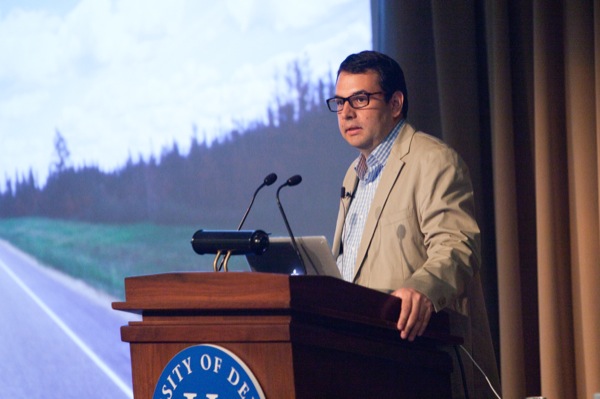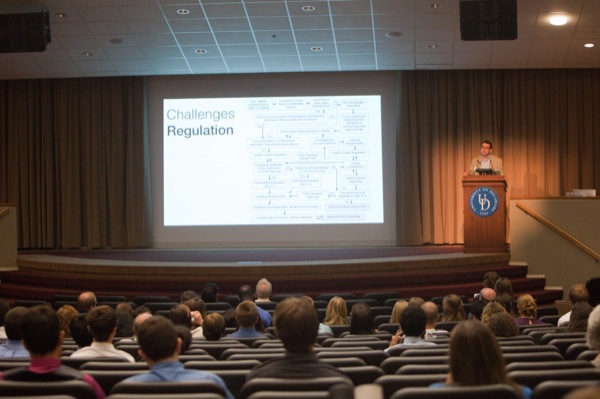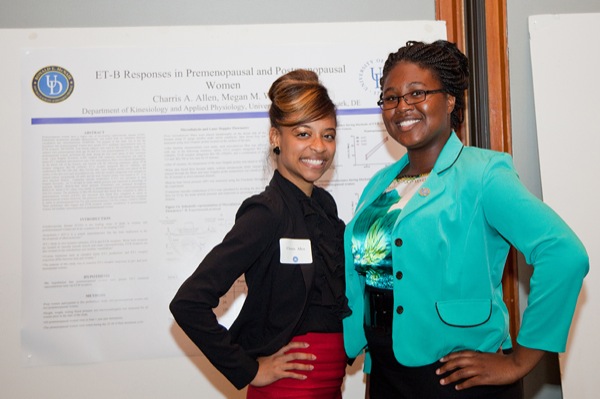


Undergraduate capstone
Symposium showcases summer undergraduate research, service projects
2:27 p.m., Aug. 13, 2013--The culmination of a summer’s worth of student scholarship was showcased during the fourth annual University of Delaware Undergraduate Research and Service Celebratory Symposium held Thursday, Aug. 8, in Clayton Hall.
Nearly 300 undergraduate research and service scholars and visiting scholars participated in the capstone event, which included 215 poster presentations and 81 oral presentations.
Research Stories
Chronic wounds
Prof. Heck's legacy
José Gómez-Márquez, a Massachusetts Institute of Technology (MIT) researcher, gave the plenary lecture, “Hacker Nurses, Legos and the Road to Construction Sets for Health.”
Gómez-Márquez and his team of researchers at MIT use parts from toys to make affordable medical devices for people in developing countries.
“About 90 percent of medical technological devices used in developing countries are donated,” Gómez-Márquez said. “The problem is that from 50 to 80 percent of these fail within six months because they are not adaptable to the areas and the people they are intended to help.”
Gómez-Márquez noted that the typical donations represent a “Ferrari” kind of approach when the situation calls for a “Land Rover” toughness and adaptability to work under less than ideal conditions.
“One of the ways to empower better design is to empower the users of these devices,” Gómez-Márquez said. “Sometimes, very extreme health care needs require extreme solutions.”
“Many of the diseases seen in developing countries are reappearing in developed countries as travel becomes more accessible,” Gómez-Márquez said. “We are now seeing diseases that we used to consider as someone else’s problem.”
In the developing countries, practical and workable solutions might include, for instance, the use of a $7 bicycle pump to power nebulizers for treating childhood asthma cases in Latin America.
“Childhood asthma is a particular problem in Latin American countries, where a child can die in five minutes from an asthma attack,” Gómez-Márquez said. “The nearest hospital can be at least 20 minutes away, and often there is no electricity to run the devices typically used in developed countries. The bicycle pump does the same thing and helps to deliver treatment deep in to the patient’s lungs.”
Health care workers in developing countries are often able to design devices made from less expensive materials that also can be obtained in relatively large quantities, Gómez-Márquez said.
“It’s not always about the gadget,” Gómez-Márquez said. “It’s about the people and how to empower them to make better tools and get the word out.”
Gómez-Márquez congratulated the symposium participants on their summer research, which was featured in oral and poster presentations.
“You all do such amazing work here,” Gómez-Márquez said. “Undergraduate research is important to your education, but it is even more important to world research efforts.”
Gómez-Márquez' talk was made possible and sponsored by UD's Howard Hughes Medical Institute grant for undergraduate science education.
Showcase
Lynnette Overby, director of UD’s Office of Undergraduate Research and Experiential Learning, said the symposium serves as a means for students to showcase their summer research efforts and often leads to further research involvement.
“The students grow in many ways, and being involved in the research and presentations allows them to gain insight into their future academic and career paths,” Overby said. “Many students continue to pursue research and service opportunities that lead to completion of a senior thesis and entry into graduate programs that build on their initial research experience.”
The presentations represent weeks of intensive experience by undergraduate students working in laboratories, schools and local community service centers.
Sophie Bandlow, a senior elementary and special education student, worked with 50 children, ages 5-10 years, at the Boys and Girls Clubs of Wilmington.
“I ran a math program with different activities each week, utilizing the Guided Discovery method, teaching for understanding rather than memorization,” Bandlow said. “The children really liked it. By the time I was finished, they were really excited and didn’t want to stop.”
Stacey Wallace, a junior chemical engineering major and a Ronald McNair Program scholar, presented a poster on “Making Sense of Large Scale Cancer Data Using Continuous Bayesian Networks.”
“By compiling large-scale cancer data, our goal was to determine the progression of lung cancer using the methods discussed in my poster,” Wallace said. “As a chemical engineering student, this let me work outside of my discipline and served as a segue to studying basic predictive analytics.”
Charris Allen, a senior exercise physiology major and Ronald McNair Program scholar, presented her poster on “ET-B Responses in Premenopausal and Postmenopausal Women.”
“I wanted to see why postmenopausal women have a higher risk of developing cardiovascular diseases,” Allen said. “The symposium was very interesting. I was nervous at first, but all my research paid off. It was great that my mentor, Megan Wenner, assistant professor of kinesiology and applied physiology, came to support me.”
Sustainability prize
The third annual Interdisciplinary Undergraduate Research in Sustainability Prize was awarded during the symposium. The winners are as follows:
• First place: Nicole Seymour, a senior in the College of Arts and Sciences, “The Car Free Guide: An Outcome of the Assessment of Transit-Friendliness in the City of Newark.” Faculty mentor, Jerome Lewis, director of the Institute for Public Administration.
• Second place: Rebecca Bronstein, a senior in the College of Earth, Ocean, and Environment, “Developing a Sustainability Studies Model at the University of Delaware.” Faculty mentor, John Madsen, associate professor of geological sciences.
• Third place: Lisa George, a senior in the College of Arts and Sciences, “Modified Ride-On Car Use for Mobility and Socialization.” Faculty mentor, Cole Galloway, professor of physical therapy.
The Sustainability Prize was established by the Undergraduate Research Program, the University of Delaware Library and Gale, a leading organization in e-research and educational publishing, to encourage undergraduate research and projects in the area of sustainability.
The prize is presented in conjunction with the implementation of the Global Reference on the Environment, Energy and Natural Resources (GREENR) database by the University Library.
The symposium is supported by the Alliance of Summer Scholar Programs, composed of directors, coordinators and representatives of each of the University’s Summer Scholar Programs.
Article by Jerry Rhodes
Photos by Kathy F. Atkinson and Ambre Alexander










